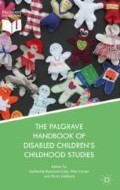Abstract
-
The underlying premise on which this chapter is based is the right of all children to have their voices heard, regardless of any impairment. From this perspective, the ethics of research with disabled children apply to all children, but research with some more vulnerable children may need additional thought on the part of the researcher. The chapter does not pretend to offer conclusive answers, but rather encourages researchers and others to consider the current and ongoing implications of research undertaken with children and young people.
-
What does informed consent mean in research with disabled children? Does this differ from assent? How can we avoid excluding children from research on the grounds of lack of competency?
-
What do parent or other significant adult researchers need to consider when reporting their own and their disabled children’s experiences?
-
How might a young person or an adult view what was written about them in a research account about their childhood experiences written when they were a child?
Access this chapter
Tax calculation will be finalised at checkout
Purchases are for personal use only
References
Alderson, P. (2014). Ethics. In A. Clark, R. Flewitt, M. Hammersley, & M. Robb (Eds.), Understanding Research with Children and Young People. London: Sage.
BERA. (2011). Ethical Guidelines for Educational Research. London: British Educational Research Association.
Cocks, A. J. (2006). The Ethical Maze: Finding an Inclusive Path Towards Gaining Children’s Agreement to Research Participation. Childhood, 13(2), 247–266.
Connors, C., & Stalker, K. (2007). Children’s Experiences of Disability: Pointers to a Social Model of Childhood Disability. Disability & Society, 22(1), 19–33.
Curran, T., & Runswick-Cole, K. (2014). Disabled Children’s Childhood Studies: A Distinct Approach? Disability & Society, 29(10), 1617–1630.
Ellis, C. (2007). Telling Secrets, Revealing Lives: Relational Ethics in Research with Intimate Others. Qualitative Inquiry, 13(1), 3–29.
Ellis, C., & Bochner, A. P. (2000). Autoethnography, Personal Narrative, Reflexivity: Researcher as Subject. In N. K. Denzin & Y. S. Lincoln (Eds.), Handbook of Qualitative Research (2nd ed., pp. 733–768). Thousand Oaks: Sage.
Gabb, J. (2009). Researching Family Relationships: A Qualitative Mixed Methods Approach. Methodological Innovations Online, 4(2), 37–52.
Gabb, J. (2010). Home Truths: Ethical Issues in Family Research. Qualitative Research, 10(4), 461–478.
Hollway, W. (2009). Applying the ‘Experience-near’ Principle to Research: Psychoanalytically Informed Methods. Journal of Social Work Practice, 23(4), 461–474.
Hollway, W., & Jefferson, T. (2000). Biography, Anxiety and the Experience of Locality. In P. Chamberlayne, J. Bornat, & T. Wengraf (Eds.), The Turn to Biographical Methods in Social Science (pp. 167–180). London: Routledge.
Hollway, W., & Jefferson, T. (2013). Doing Qualitative Research Differently: A Psychosocial Approach (2nd ed.). London: Sage.
Lauwers, H., & Van Hove, G. (2010). Supporting the Participation Rights of Children in a Sensitive Research Project: The Case of Young Road Traffic Victims. The International Journal of Children’s Rights, 18(3), 335–354.
Lundy, L., McEvoy, L., & Byrne, B. (2011). Working with Young Children as Co-Researchers: An Approach Informed by the United Nations Convention on the Rights of the Child. Early Education and Development, 22(5), 714–736.
McNeilly, P., Macdonald, G., & Kelly, B. (2015). The Participation of Disabled Children and Young People: A Social Justice Perspective. Child Care in Practice, 21(3), 266–286.
Meerwald, A. M. L. (2013). Researcher | Researched: Repositioning Research Paradigms. Higher Education Research and Development, 32(1), 43–55.
Merrill, B., & West, L. (2009). Using Biographical Methods in Social Research. London: Sage.
Murray, B. L. (2010). Secrets of Mothering. PhD unpublished, University of Saskatchewan, Saskatoon.
Murray, L., Pushor, D., & Renihan, P. (2011). Reflections on the Ethics-Approval Process. Qualitative Inquiry, 18(1), 43–54.
Nuremberg Code. (1947). Directives for Human Experimentation. http://ori.hhs.gov/ori-introduction-responsible-conduct-research. Accessed 31 Aug 2015.
Page, J. M. (2013). Childcare Choices and Voices: Using Interpreted Narratives and Thematic Meaning-Making to Analyse Mothers’ Life Histories. International Journal of Qualitative Studies in Education, 27(7), 850–876.
Pahl, K., & Pool, S. (2011). Living Your Life Because it’s the Only Life You’ve Got. Qualitative Research Journal, 11(2), 17–37.
Riessman, C. K. (2008). Narrative Methods for the Human Sciences. London: Sage.
Rogers, C. (2003). The Mother/Researcher in Blurred Boundaries of a Reflexive Research Process. Auto/Biography, 11(1&2), 47–54.
Rogers, C. (2007). Experiencing an “Inclusive” Education: Parents and Their Children with “Special Educational Needs”. British Journal of Sociology of Education, 28(1), 55–68.
Saunders, B., Kitzinger, J., & Kitzinger, C. (2015). Anonymising Interview Data: Challenges and Compromise in Practice. Qualitative Research, 15(5), 616–632.
Sikes, P. (2000). Truth and Lies Revisited. British Educational Research Journal, 26(2), 257–270.
Stanley, L. (1992). The Auto/Biographical I. Manchester: Manchester University Press.
Sykes, A. J. M. (1965). Myth and Attitude Change. Human Relations, 18(4), 323–337.
Thackray, L. (2013). The Meanings of the ‘Struggle/Fight Metaphor’ in the Special Needs Domain: The Experiences of Practitioners and Parents of Children with High Functioning Autism Spectrum Conditions, PhD unpublished, University of Sussex. Retrieved from http://sro.sussex.ac.uk/47168/
Truss, C. (2008). Peter’s Story: Reconceptualising the UK SEN System. European Journal of Special Needs Education, 23(4), 365–377.
UNCRC. (1989). The United Nations Convention on the Rights of the Child. http://www.unicef.org.uk/UNICEFs-Work/UN-Convention/. Accessed 31 Aug 2015.
Author information
Authors and Affiliations
Editor information
Editors and Affiliations
Copyright information
© 2018 The Author(s)
About this chapter
Cite this chapter
Thackray, L. (2018). Anonymity, Confidentiality and Informed Consent: Exploring Ethical Quandaries and Dilemmas in Research with and About Disabled Children’s Childhoods. In: Runswick-Cole, K., Curran, T., Liddiard, K. (eds) The Palgrave Handbook of Disabled Children’s Childhood Studies. Palgrave Macmillan, London. https://doi.org/10.1057/978-1-137-54446-9_20
Download citation
DOI: https://doi.org/10.1057/978-1-137-54446-9_20
Published:
Publisher Name: Palgrave Macmillan, London
Print ISBN: 978-1-137-54445-2
Online ISBN: 978-1-137-54446-9
eBook Packages: Social SciencesSocial Sciences (R0)

